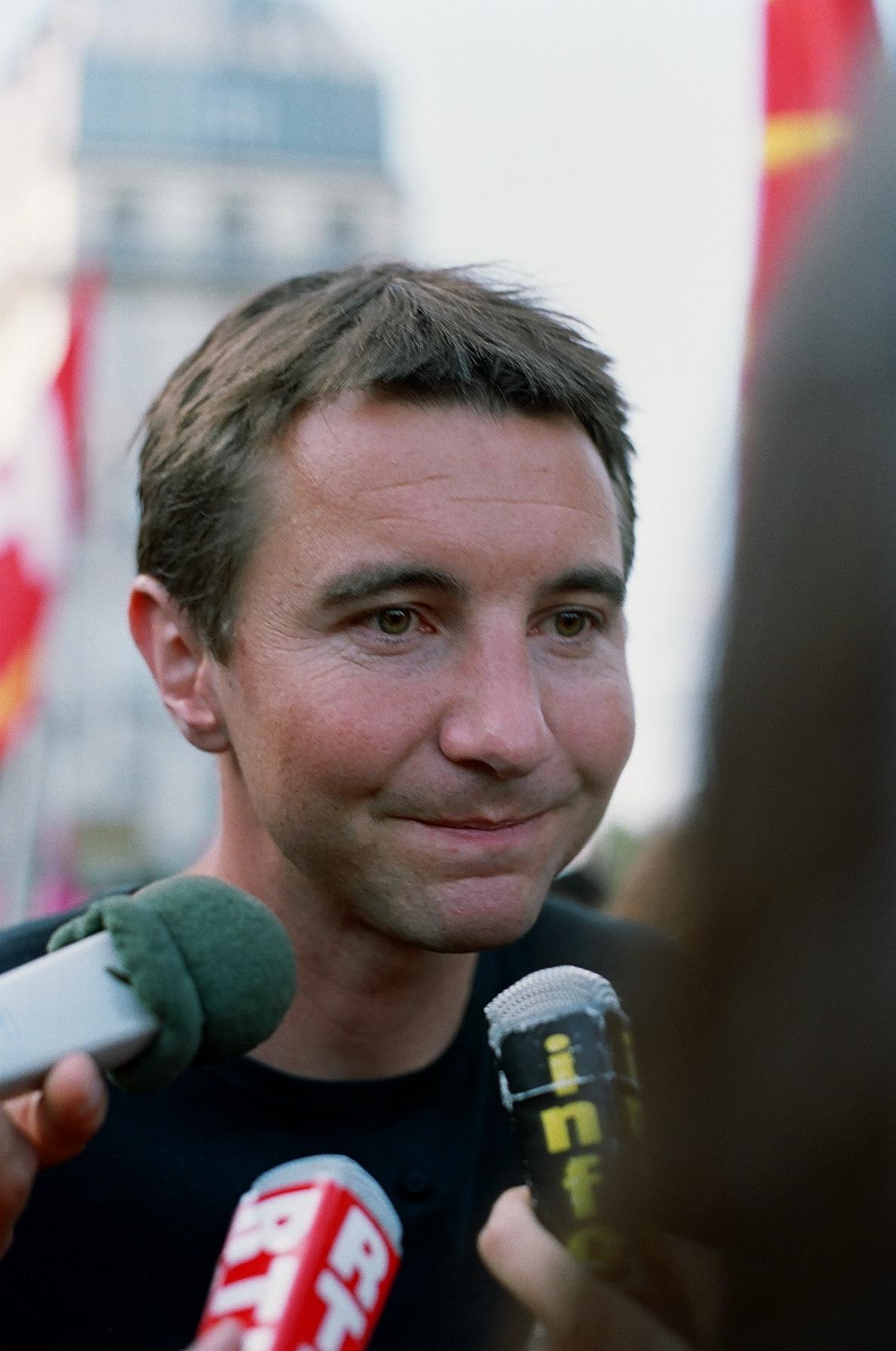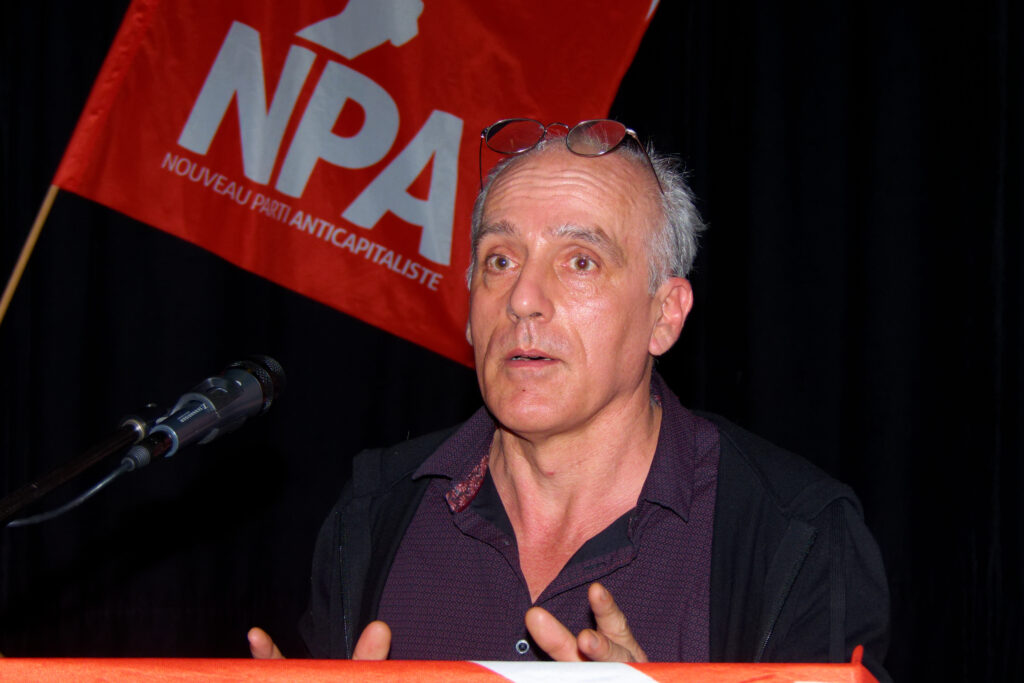Ukraine and the Left: Olivier Besancenot

The 2002 presidential election in France saw the first appearance of Olivier Besancenot, a 27-year-old mailman and a member of the Ligue communiste révolutionnaire (Revolutionary Communist League), the French section of the Fourth International. The party described itself as Trotskyist. The LCR party meeting in September 2001 formally endorsed Besancenot as their presidential candidate. The question of whether the group should stand aside for the dominant Left candidate–in other words, the Socialist Party candidate, who would be Lionel Jospin–was briefly raised but immediately shut down by longtime Leftist stalwart Alain Krivine, who said the answer was “no.” Besancenot gave a well-received speech to some 500 party activists, splitting his attacks between the “institutional Left” (Jospin) and Incumbent president Jacques Chirac.[1]
Besancenot, born in 1974 and raised in a middle class family, had grown up in the midst of globalization, factory closings, massive industrial job losses, and despair. He had become an activist in several of the major demonstrations at the turn of the century. His campaign book, Tout est à Nous! (Everything is ours!, a slogan from the anti-G8 counter demonstration in Genoa in July 2001), is unusually engrossing for a campaign book, since it mixes his personal experiences (he was in Genoa in 2001, and the year before that, in Nice) with citations from international reports on the effects of globalization in poor countries. The Socialist Party of Jospin, who had held the prime ministership from 1997-2002, made small changes around the margins of austerity and deregulation; Besancenot represented, as he himself noted, a new generation that saw capitalist imperialism as the greatest threat to the working classes in France and in the world.
There were 16 candidates in the first round of the election, many of them on the Left. Besancenot was in the middle of the pack in the first round, beating out 8 others, and receiving 1,210,562 votes for 4.25% of the total. [2] The election of 2002 was famous because Jospin, the Socialist, came in a close third; the second round was between Chirac, on the Right, and Jean-Marie Le Pen, marking the first time that the National Front Party had made it into the final round.
Besancenot still works at the post office, though now, as he has said, at the window rather than delivering mail. He ran for President again in 2007. In a field of 12 candidates, he received 1,498,581 votes, for 4.08%. In 2009, Besancenot formed the Nouveau Parti Anticapitaliste (NPA, or New Anticapitalist Party), and “retired” from running for office, providing strong support instead to the NPA standard-bearer Philippe Poutou, a former trade union activist and auto factory worker, in 2012, 2017, and 2022.
****
That, then, is who Besancenot is, and he went to Ukraine in early May, 2022. He was interviewed by Mediapart when he returned.[3] It was a very important interview, in which he admitted that the left was struck with “a form of political paralysis” in speaking of the war in Ukraine. He meant his Left, the radical Left or even sectarian Left, for whom “American Imperialism” was one word.[3]. (“Imperialism,” he reminded his party, is not a word “reserved for North American politics in Latin America.”)
One of those who had difficulty discussing the war was the candidate he supported, Philippe Poutou. On Public Sénat, asked about the war, in an interview just after the Russian withdrawal from Bucha and the evidence of mass murder of civilians, after commenting that it was a “weird question,” he was simply able to say that he supported the popular movement of the Ukrainian people; US intervention in Afghanistan, the Russians in Syria, had not led to good outcomes. It was not a good answer; Poutou was on much firmer ground when talking about capitalism and the essential sameness of all political parties. But, as he commented in the course of the interview, no one was listening to them anyway.[4]

Besancenot had been in Ukraine from 3-8 May 2022, and had been in the western area around Lviv, away from the fighting in the east. He had been invited by a Ukrainian leftist organization, Mouvement social, as well as the Reseau européen de solidarité avec l’Ukraine et contre la guerre. His group had also met with two women’s groups in Ukraine, Feminist Workshop and Bilkis. Many women were themselves fighters; those in the zones occupied by Russian troops were targets of rape, or they were forced into prostitution when they became homeless after fleeing for their lives. He noted that even though the fall of communism had occurred 30 years ago, it was still rather dangerous to admit Leftist sympathies; and yet what struck him most most was that these groups were politically active in their causes, even as they resisted Putin’s invasion, “continuing their struggles against the (Neo)liberal politics that President Zelensky leads.” He noted, for example, that Zelensky was using “the context of war” to “facilitate layoffs in factories and businesses.”
(European Union directives in regard to labor laws are one of the reasons that Ukraine has not already been admitted to the EU, but that is a very complicated set of circumstances.)
In a very important statement, he noted that “these Leftist activists of the Ukrainian Left mean also signify to the French and European Left that Russian aggression has a name: it is an imperialist offensive.” It is hard not to see that as a message to Jean-Luc Mélenchon in particular, who has been favorable to Putin against the imperialist United States; and to the Far Right Marine Le Pen as well, who has, like Mélenchon, called for a closer relationship with Russia.
Asked about the NPA position on the war (which, as they noted, had been going on in Ukraine since 2014):
“Our rule can appear elementary: we are on the side of the oppressed, never on that of the oppressors. . . . This Russian imperialism reconnects with the expansionist tendencies of the tsars, that the Bolsheviks had broken with after 1917, in pronouncing in favor of self-determination, before the Stalinist counter-revolution. Putin did not forget to oppose Stalin to Lenin at the time of his declaration of war.”
(Besancenot was referring, here, to Putin’s harsh criticism of Lenin’s policy of dividing Russia into the separate “Republics” of the USSR, in contrast to Stalin’s belief in a unitary state. This was not a new criticism for Putin, but The Guardian reported the “surprise,” in 2016, when Putin had apparently first introduced this attack on Lenin, stating that Lenin’s mistake had placed a “time bomb” under the state; Putin’s example was Donbass which, he said, should not have been placed in Ukraine.)[5]
Besancenot thus took the opportunity to warn “the European Left” not to fall into old patterns of thinking: “The conflict in Ukraine marks the end of a cycle, that of the ‘happy globalization’ of the capitalists. The competition between the blocs has been reaffirmed in these last years and Putin’s Russia hopes to find new opportunities outside its frontiers. . . . the denouement of this war will thus have an impact on the social and political forces of the entire world. The [world] situation will not be the same whether imperialism wins, or whether it loses.”
To be sure, Besancenot also thinks that NATO should have “disappeared” after 1991 and the dissolution of the USSR, and he thinks it is part of the “problem” rather than the solution. But he also is further evidence of a split on the Left, between those locked into a reflexive defense of Putin’s grievances and those willing to call his invasion what it is.
==========================================
Header Image: By Kenji-Baptiste OIKAWA – Olivier Besancenot, CC BY 3.0, https://commons.wikimedia.org/w/index.php?curid=2800366
[1]Caroline Monnot, “La LCR prédit un fabuleux destin à son poulain Olivier Besancenot,” Le Monde, September 2, 2001. https://www.lemonde.fr/archives/article/2001/09/02/la-lcr-predit-un-fabuleux-destin-a-son-poulain-olivier-besancenot_4190675_1819218.html
[2]. Election results can be found on the website of the Ministère de l’Intérieur.
[3] Laurent Geslin and Mathilde Goanec, “Olivier Besancenot: ‘Une forme de paralysie politique travaille la gauche française sur la guerre en Ukraine,’” Mediapart, May 11, 2022. https://www.mediapart.fr/journal/international/110522/olivier-besancenot-une-forme-de-paralysie-politique-travaille-la-gauche-francaise-sur-la-guerre-en
The rest of this post, unless otherwise noted, comes from the Mediapart article.
[4] https://www.facebook.com/publicsenat/videos/philippe-poutou-la-violence-est-l%C3%A9gitime-%C3%A0-partir-du-moment-o%C3%B9-il-y-a-une-oppres/3191443191133906/?locale=ms_MY The date is April 4, 2022.
[5] [5] “Vladimir Putin accuses Lenin of placing a ‘time bomb’ under Russia,” The Guardian, January 25, 2016. https://www.theguardian.com/world/2016/jan/25/vladmir-putin-accuses-lenin-of-placing-a-time-bomb-under-russia